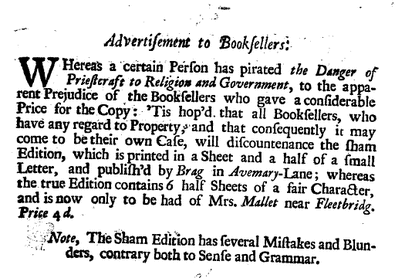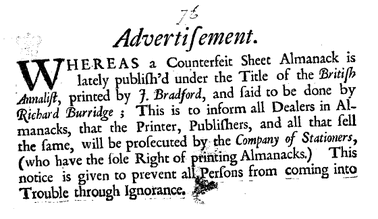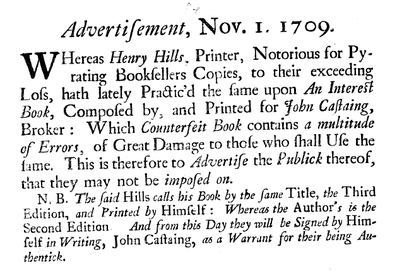|
It seems like every day I receive a Google Alert, kindly informing me that another site has popped up, allowing my books to be downloaded for free. Not only are these parasitic companies stealing from me and other authors, but to add insult to injury, many users actually post comments on these sites, thanking these bottom-dwellers for the "service" they provide to readers. Sometimes these comments are so heartfelt it makes me wonder if the users don't realize they are committing an actual crime. Is that possible? Taking a step away from my indignant high horse for a moment, I do find it interesting that plagiarism and piracy of books has been around since the invention of the printing press. Initially, imitation in the Renaissance was seen as a compliment, a form of flattery, at least in art. In the world of the cheaply printed piece, necessity and practicality were at the heart of imitation. Printers regularly used the same woodcut again and again--say, of someone being hanged--most likely for ease of use and to evoke a certain image or memory in the audience. But over the next century or two, there seemed to be growing concern with the ability of printers to simply reset a piece and sell it for themselves. On occasion, advertisements to booksellers were created, informing them when a "sham" edition of a book had been created. They would implore the bookseller to consider the nature of property; they also seemed to speak to the bookseller's sense of quality, by reminding them of the inferiority of the sham piece. For example, this next advertisement reminds the bookseller that "The sham edition has several mistakes and blunders, contrary both to sense and grammar." Some of these advertisements even specified that the printer, publishers and dealers would be prosecuted by the Company of Stationers, who as a royal guild had the sole power to oversee the publication of most written work, including almanacks as described in this next advertisement. In particular, I like the last line, which warns against those who would claim not to have known they were doing anything illicit: "This notice is given to prevent all persons from coming into trouble through ignorance." Lastly, I suspect this is where the practice of authors signing their own books came from--the author was attesting to the authenticity of his (or possibly, her) books. I don't know if its particularly heartening to realize that piracy and plagiarism are not a new phenomenon for authors. But it is interesting to think that such acts had long been condemned by the publishing community, even if the problem is still present 200 years later.
In my next post, I will tell you what happened to one of these plagiarists...
3 Comments
Hadas
7/1/2015 08:52:09 am
You might be interested in this (light) article about literary piracy from even earlier: http://www.vox.com/2015/6/1/8697947/elizabethan-book-pirates
Reply
10/19/2015 03:06:50 am
You show us the facts that stun. I couldn't imagine such a thing existed earlier. I guess they were everywhere and anytime. Such is life.
Reply
Leave a Reply. |
Susanna CalkinsHistorian. Mystery writer. Researcher. Teacher. Occasional blogger. Categories
All
Archives
May 2023
|



 RSS Feed
RSS Feed